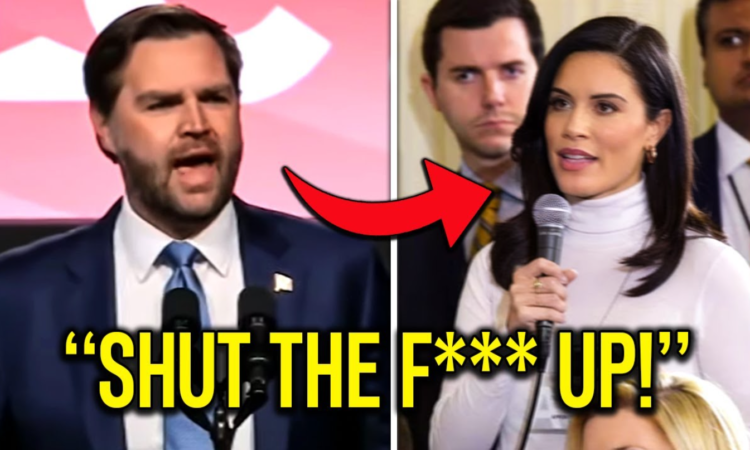JD Vance’s Speech Is Interrupted By Liberal Reporter—His Response Left Everyone Speechless!

A liberal reporter tried to corner JD Vance with a loaded question, but his brutal response had the whole crowd watching in stunned silence. The air outside the convention center in Columbus, Ohio, was thick with anticipation. Supporters had been gathering since early morning, braving the heat just to see JD Vance speak in person. Some held banners, others clutched signs with bold lettering showing clear support.
Inside, the atmosphere buzzed with energy. Conversations hummed across the packed auditorium. The stage was simple, lit brightly, with a podium that bore JD Vance’s name. Volunteers in matching T-shirts handed out pamphlets while security watched the doors closely. News cameras lined the back of the venue, red lights blinking as journalists prepped for live coverage.
Suddenly, the energy in the room shifted. A swell of cheers rose as JD Vance stepped onto the stage. Calm and composed, wearing a dark suit with rolled-up sleeves, he projected confidence. He gave a brief nod to the crowd and adjusted the mic. “Folks,” he began, his voice steady, “it’s good to be here with you tonight.” Cheers and whistles followed. He paused, letting the moment breathe.
“We’re at a turning point,” he said. “A moment where we decide: do we keep pushing forward and build a country we’re proud of? Or let the same broken voices keep dragging us down?” The crowd clapped and shouted in agreement.
“But let’s be real,” he added, leaning in, “we’ve got a fight on our hands.” His tone shifted from measured to passionate. He spoke about the economy, crime, and failed policies. The audience reacted with strong applause and loud affirmations.
Then, a voice cut through the noise. It wasn’t a cheer or a shout. It was calm, sharp, and deliberate.
“Senator Vance, do you actually believe that?”
Everything seemed to freeze. Heads turned. A woman near the press section held a microphone. It was Andrea Holt, a known journalist from a major liberal network. Confident, composed, she didn’t heckle—she challenged.
“You talk about building something better,” she said. “But what do you say to the people who feel left behind by your policies?”
The room grew tense. Some groaned, others muttered. Vance tightened his grip on the podium but kept his expression steady. He scanned the room, then leaned forward.
“You know,” he said calmly, “I always find it interesting how these conversations are framed.”
Andrea listened, still poised.
“You bring up wages and housing—and you’re right, people are hurting. But let me ask you something, Andrea. When was the last time you talked to someone who isn’t in your newsroom? Someone living paycheck to paycheck?”
Andrea blinked. Just a bit.
“I’m guessing not recently,” Vance continued, not giving her time to respond. “Because if you had, you’d know people aren’t just worried about money. They’re worried about crime, about schools failing their kids, about jobs lost because of policies created by people who never face the fallout.”
A few claps echoed through the crowd.
“But let’s be honest,” he said, standing straighter. “You’re not asking that question for them. You’re trying to frame a narrative. To put me on the defensive. That’s how this works, right?”
The room rumbled louder. Andrea held her posture, lips pressed thin.
Vance paused, then added, “The reason people are frustrated isn’t because politicians give bad speeches. It’s because no one listens—not the government, not the media, not even the people claiming to speak for them.”
He looked directly at her.
“You come in here with a question meant to make me look like I don’t care. That way, you don’t have to talk about the real issues.”
The audience murmured, heads turning toward Andrea.
“I grew up in Middletown, Ohio. My family struggled. I know what it’s like when bills stack up and your town falls apart. You wanna talk about wages? Let’s talk about the policies that crushed factory towns. You wanna talk housing? Let’s talk about working-class families being pushed out because foreign investors are buying up whole neighborhoods.”
The crowd cheered, loud and clear.
“You wanna talk about people being left behind?” Vance said, his voice firm. “Then start by asking why they feel that way—not assuming you already know.”
Andrea held the mic tightly. She opened her mouth—but Vance raised his hand gently, not to interrupt, but to finish.
“I’ll answer any question you’ve got, Andrea,” he said, unwavering. “But let’s make sure it’s a real conversation—not just a performance.”
Applause broke out again. Andrea exhaled. She had asked her question. He had answered. But in that moment, the room belonged to him.




